英美国家概括选择题英国部分
英美概况习题答案
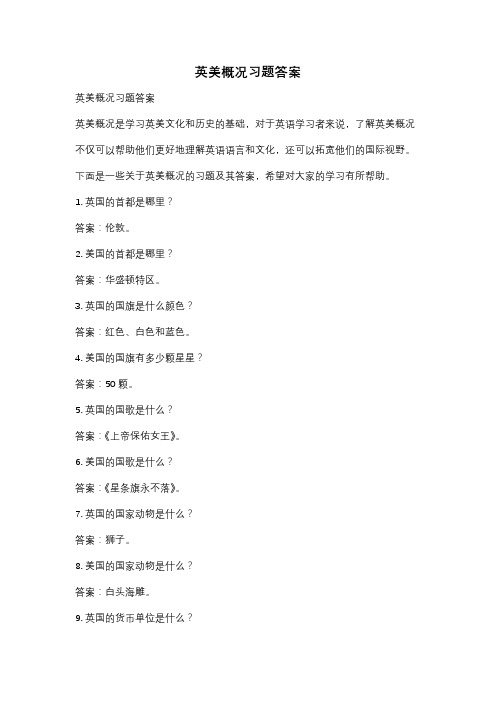
英美概况习题答案英美概况习题答案英美概况是学习英美文化和历史的基础,对于英语学习者来说,了解英美概况不仅可以帮助他们更好地理解英语语言和文化,还可以拓宽他们的国际视野。
下面是一些关于英美概况的习题及其答案,希望对大家的学习有所帮助。
1. 英国的首都是哪里?答案:伦敦。
2. 美国的首都是哪里?答案:华盛顿特区。
3. 英国的国旗是什么颜色?答案:红色、白色和蓝色。
4. 美国的国旗有多少颗星星?答案:50颗。
5. 英国的国歌是什么?答案:《上帝保佑女王》。
6. 美国的国歌是什么?答案:《星条旗永不落》。
7. 英国的国家动物是什么?答案:狮子。
8. 美国的国家动物是什么?答案:白头海雕。
9. 英国的货币单位是什么?答案:英镑。
10. 美国的货币单位是什么?答案:美元。
11. 英国的国教是什么?答案:英国国教(圣公会)。
12. 美国的国教是什么?答案:美国没有国教,宪法保障宗教自由。
13. 英国的国会叫什么?答案:英国议会。
14. 美国的国会叫什么?答案:美国国会。
15. 英国的最高法院是什么?答案:英国最高法院。
16. 美国的最高法院是什么?答案:美国最高法院。
17. 英国有几个地区?答案:四个地区,分别是英格兰、苏格兰、威尔士和北爱尔兰。
18. 美国有几个州?答案:50个州。
19. 英国的最长河流是什么?答案:塔普河(Thames River)。
20. 美国的最长河流是什么?答案:密西西比河(Mississippi River)。
这些习题涵盖了英美概况的一些基本知识点,希望能够帮助大家更好地了解英美文化和历史。
当然,英美概况远不止这些,还有很多有趣的知识等待我们去探索和学习。
希望大家能够保持对英美概况的兴趣,并不断深入学习,提高自己的英语水平和跨文化交流能力。
英美国家概况(英国部分)Unit 1 Geograpgy
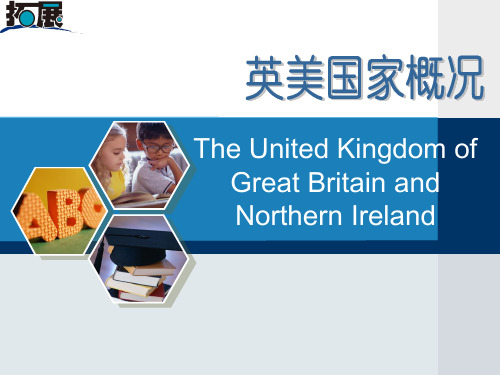
Landforms
Overview England Scotland Wales Northern Ireland
Overview
• The island of Great Britain can be roughly divided into the lowland area and the highland area. The former comprises Midland, Southern and eastern England, and the latter the broad central upland known as the Pennines, the Lake District, most of Wales and Scotland.
River 泰晤士河 • The largest lake in Britain: Lough
Neagh: /lɒx neɪ/ Lake 内伊湖 • Most famous universities: Oxford University;
Cambridge University
Lesson 1 Geography: The Land
• The Name of the Country • Location and Size • Landforms • Rivers and Lakes • The Coast • Climate • Natural Resources
1. The Name of the Country
Several names to distinguish: • British Isles • UK • Great Britain • Britain • England
➢ The industrial center
英语国家概况英国部分答案
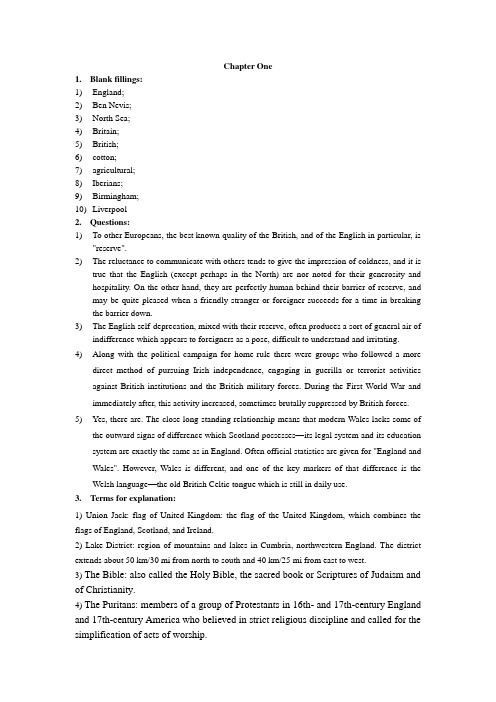
Chapter One1.Blank fillings:1)England;2)Ben Nevis;3)North Sea;4)Britain;5)British;6)cotton;7)agricultural;8)Iberians;9)Birmingham;10)Liverpool2.Questions:1)To other Europeans, the best known quality of the British, and of the English in particular, is"reserve".2)The reluctance to communicate with others tends to give the impression of coldness, and it istrue that the English (except perhaps in the North) are nor noted for their generosity and hospitality. On the other hand, they are perfectly human behind their barrier of reserve, and may be quite pleased when a friendly stranger or foreigner succeeds for a time in breaking the barrier down.3)The English self-deprecation, mixed with their reserve, often produces a sort of general air ofindifference which appears to foreigners as a pose, difficult to understand and irritating.4)Along with the political campaign for home-rule there were groups who followed a moredirect method of pursuing Irish independence, engaging in guerilla or terrorist activities against British institutions and the British military forces. During the First World War and immediately after, this activity increased, sometimes brutally suppressed by British forces. 5)Yes, there are. The close long-standing relationship means that modern Wales lacks some ofthe outward signs of difference which Scotland possesses—its legal system and its education system are exactly the same as in England. Often official statistics are given for "England and Wales". However, Wales is different, and one of the key markers of that difference is the Welsh language—the old British Celtic tongue which is still in daily use.3. Terms for explanation:1) Union Jack: flag of United Kingdom: the flag of the United Kingdom, which combines the flags of England, Scotland, and Ireland.2) Lake District: region of mountains and lakes in Cumbria, northwestern England. The district extends about 50 km/30 mi from north to south and 40 km/25 mi from east to west.3) The Bible: also called the Holy Bible, the sacred book or Scriptures of Judaism and of Christianity.4) The Puritans: members of a group of Protestants in 16th- and 17th-century England and 17th-century America who believed in strict religious discipline and called for the simplification of acts of worship.5) Great Charter: document sealed by King John of England on June 15, 1215, in which he made a series of promises to his subjects that he would govern England and deal with his vassals according to the customs of feudal law (see Feudalism). Over the course of centuries, these promises have required governments in England (and in countries influenced by English tradition) to follow the law in dealing with their citizens.4. Analysis and comments:1) In the United Kingdom, the upper classes are the aristocracy and royalty, with wealth playing a less important role in class status. Many aristocratic peerages or titles have …seats‟ attached to them, with the holder of the title (e.g. Earl of Bristol) and his family being the custodians of the house, but not the owners. Many of these require high expenditures, so wealth is typically needed. Many aristocratic peerages and their homes are parts of estates, owned and run by the title holder with moneys generated by the land, rents, or other sources wealth. The middle class is the most contested of the three categories, the broad group of people in contemporary society who fall socio-economically between the lower and upper classes. Lower class are those employed in low-paying wage jobs with very little economic security.2) It was sealed under oath by King John at Runnymede, on the bank of the River Thames near Windsor, England. Magna Carta was the first document forced onto a King of England by a group of his subjects, the feudal barons, in an attempt to limit his powers by law and protect their rights. The charter is widely known throughout the English speaking world as an important part of the protracted historical process that led to the rule of constitutional law in England and beyond.Chapter Two1.Blank fillings:1)parliamentary democracy;2)the House of Commons, the House of Lords;3)the House of Commons;4)the Queen;5)executive;6)constitution;7)European Union (EU);8)military equipment;9)The Lord Chancellor;10)proven guilty2.Questions:1)The contemporary foreign policy of the UK is greatly influenced by its imperial history andalso by its geopolitical traits. Perhaps the most important single factor which influences British policy-makers is its history.2)The word "parliament" comes from the verb "to parley", that is, to discuss or talk. The termwas first used officially in 1236 to describe the gathering of feudal barons and representatives from counties and towns which the king occasionally summoned if he wanted to raise money.3)There are three major national parties: The Conservative party and the Labour party are thetwo biggest, and any general election is really about which of those two is going to govern.But there is a third important party, the Liberal Democrats, who usually receive up to about 20% of the votes: not enough to form a government, but enough to have a big impact on which of the other two parties does so. The Conservative Party spent most time in power4)The House of Commons.5)The party that wins most votes in general election and the leader of this winning party wouldbecome Prime Minister.3.Terms for explanation:1)Britain‟s legislature is made up of the House of Commons, the House of Lords and the kingin his constitutional role. The House of Commons has 651 elected Members of Parliament (MPs), who represent local constituencies. The center of parliamentary power is the House of Commons.2)The nonelected upper house of Parliament in the United Kingdom, made up of life peers,some hereditary peers, and some bishops.3)In British criminal trials the accused is presumed innocent until proven guilty. Trials are inopen court and the accused is represented by a lawyer. Most cases are tried before layjustices sitting without a jury. The more serious cases are tried in the higher courts before a jury of 12 (15 in Scotland) which decides guilt or innocence.4)Actions brought to court are usually tried without a jury. Higher courts deal with morecomplicated civil cases. Most judgments are for sums of money, and the costs of an action are generally paid by the losing party.5)The Lord Chancellor is the head of the judiciary branch of government.4. Analysis and comments:1) Constitutional monarchy is a form of democratic government in which a nonpolitical monarch acts as head of state within the boundaries of a constitution, whether written or unwritten.[1] While the monarch may hold formal reserve powers and while government officially takes place in the monarch‟s name, they do not set public policy or choose political leaders. Political scientist Vernon Bogdanor, paraphrasing Thomas Macaulay, has defined a constitutional monarch as "a sovereign who reigns but does not rule." This form of government differs from absolute monarchy, in which the monarch controls political decision-making and is not effectively bound by a constitutional order.2) Debates can be witnessed very commonly in House of Commons. They take place sometimes in harmony, but more times in a very heated situation. Think about if the debates necessary in House of Commons.Chapter Three1.Blank fillings:1)Banking;2)Insurance;3)service;4)manufacturing;5)North Sea;6)Margaret Thatcher;7)military;8)1970s;9)London;10)service;11)electronics2.Questions:1)By the 1880s the British economy was dominant in the world, producing one third of theworld‟s manufactured goods, half its coal and iron, half its cotton.2)But even by 1900 this was no longer the case, the UK having been overtaken by both theUnited States and Germany; and certainly from 1945 until the present, the story of the UK economy is usually thought of as one of decline.3)India, popularly known as "The Jewel in the Crown" of the British Empire, gained itsindependence in 1947.4)This has a number of consequences for British society, mainly positive, though with someindirect negative effects. On the positive side such immigrant groups bring their culture with them, which increases the variety and interest within British culture: for example, the UK, which used to have a bad reputation for food, now has a cuisine as varied as any, with Indian and Chinese restaurants in every community, as well as many other varieties in bigger cities.This variety in restaurant food has resulted in more experimentation at home, so that shops now carry a much wider variety of goods to supply the demand, and there are many TV programmes and books devoted to all kinds of different cooking. The negative side of things lies largely in the attitude of some of their white neighbours.5)While there is a growing ethnic minority middle-class, and many individual success stories,by most measures the immigrant population is worse-off economically speaking than the white population as a whole. Individuals from ethnic minorities are more likely to be unemployed; and they are under-represented in politics too, though there are now a number of black and Asian MPs. But there are also a number of small political parties in the UK with overtly racist policies.3.Terms for explanation:1)Conservative Party (Britain), oldest political party in the United Kingdom. The ConservativeParty evolved as the successor to the Tory Party in the 1830s. It is known in full as the Conservative and Unionist Party. The party‟s tenets of conservatism inclu de the continuance of monarchical parliamentary government. Until after the end of World War II in 1945 imperialism was also a major force in British conservatism. For decades Northern Ireland‟s major political party, the Ulster Unionist Organization, was an integral part of Britain‟s Conservative Party, but that relationship has eroded considerably. The Scottish Conservative and Unionist Association also is related to the larger unit but has a separate existence.2)Margaret Thatcher, born in 1925, British politician and the first woman to hold the office ofprime minister of the United Kingdom. The winner of three consecutive general elections, Thatcher served as prime minister from 1979 to 1990. She was the longest-serving British prime minister of the 20th century.3)The London Stock Exchange, one of the largest exchanges in the world, has always been afocus of international trade. In 1986 it was substantially deregulated, an event known as the Big Bang in financial circles. This led to the rapid expansion of products, markets, and numbers of employees, a movement that slowed in the early 1990s but has since rebounded.4)HSBC:HSBC Holdings plc is a British multinational banking and financial servicescompany headquartered in London, England, United Kingdom. It is one of the world‟s largest banks.5)Second Industrial Revolution: The Second Industrial Revolution, also known as theTechnological Revolution, was a phase of the larger Industrial Revolution corresponding to the latter half of the 19th century until World War I. It is considered to have begun around the time of the introduction of Bessemer steel in the 1860s and culminated in early factory electrification, mass production and the production line.4. Analysis and comments:1) Town and country planning in the United Kingdom is the part of English land law which concerns land use planning. Its goal is to ensure sustainable economic development and a better environment. Each country of the United Kingdom has its own planning system that is responsible for town and country planning devolved to the Northern Ireland Assembly, the Scottish Parliament and the Welsh Assembly.2) Based on the collection of history of two countries‟ economic development, a summary can be made.Chapter Four1.Blank fillings:1)owner occupation,2)semi-detached,3)Detached houses,4)Class,5)Christmas,6)Boxing Day,7)Easter egg,8)The Guardian,9)1400,10)The Broadcasting Act2.Questions:1)There are, broadly speaking, four main types of home. The first kind are "flats" (orapartments), of varying size, often in modern multi-storey purpose-built buildings, though sometimes made by sub-dividing big old houses. Flats are often publicly owned. The second kind are "terraced" houses: that is, individual two-storey houses built joining on to each other at each side in a terrace or row. The second kind are "terraced" houses: that is, individual two-storey houses built joining on to each other at each side in a terrace or row; the fourth one is “detached.”2)(Open ended)3)On an average day, 90 per cent of Britons over the age of 15 read a national or local paper.And in the evening, most Britons settle down to watch some television: 96 percent of the population watch TV at least once a week, making it Britain‟s most popular leisure activity.The third most popular pastime, after watching telly and reading newspapers, is listening to the radio, an activity in which 73 per cent of the population engages in on a weekly basis. It is obvious, then, that the media are central to British leisure culture.4)British newspaper culture is unusual in the extent to which class and educational differencesare reflected in the newspapers people read. In other developed countries like Japan and the United States, newspaper reading is a mainly middle-class habit, but in Britain the "lower classes" are also regular readers.5)While officially speaking the British press is "free" from government control and censorshipand can print what it likes, there are limits to what will appear in the daily paper.3.Terms for explanation:1)Terraced houses: refer to those individual two-storey houses built joining on to each other ateach side in a terrace or row. They often have two rooms downstairs and two bedrooms upstairs, plus a small kitchen and bathroom in a projection(突出部分) at the back. These kinds of houses are most common in inner-city areas.2)Detached houses: the most desirable houses for the British people to live in. They usuallystand alone with garden on all sides separating them a little from their neighbours. It might be one-storey house, called bungalow or two. These houses are usually built in the suburban areas.3)The Christmas Pantomime: a typical British Christmas tradition. It is a comical musical playusually based on a popular traditional children‟s story. There are two ma in characters in the play: “the principal boy”, played by a young woman, and “the Dame”(滑稽老太婆角色), played by a man. It is a play with songs and jokes which can be enjoyed by both adults and children.4)Boxing Day: a typical British tradition celebrated on the day after Christmas. People used togive Christmas gifts or money to their staff or servants on this day. And now they mostly do shopping, pay visits, enjoy eating or just relax.5)The Financial Times: The Financial Times (FT) is a British English-language internationaldaily newspaper with a special emphasis on business and economic news internationally. The paper, published by Pearson PLC in London, was founded in 1888 by James Sheridan and Horatio Bottomley, and merged with its closest rival, the Financial News (which had been founded in 1884) in 1945.4.Analysis and comments:1) The United Kingdom has one of the world‟s oldest established newspaper industries. In the late eighteenth and early nineteenth century, as the British economy began to industrialise, as the democratic franchise was extended to larger segments of the population, and as literacy levels rose through the introduction of mass education, more and more newspapers began to appear. They began to influence British society and people‟s life. T ry to gather different types of newspaper and their functions as a further study.2) In cultural studies, media culture refers to the current western capitalist society that emerged and developed from the 20th century, under the influence of mass media. The term alludes to the overall impact and intellectual guidance exerted by the media (primarily TV, but also the press, radio and cinema), not only on public opinion but also on tastes and values.Chapter Five1. Blank fillings:1)Reading, Writing, Arithmetic2)A-level3)Flexibility4)Oxbridge5)glorious wit6)church7)math, physics, computer science and economics8)12th and 13th centuries9)Forty10)tutorial2.Questions:1)In the UK, the amount of funding each university receives is based on its size, the number ofstudents it teaches, and the research it conducts. So far, the UK has only one privately funded university, the University of Buckingham.2)The British education system is run by the state.3)Cambridge University and Oxford University.4)The goal of British education is to socialize children.5)(Open ended)3.Terms for explanation:1) middle-class man: The middle class is a class of people in the middle of a societal hierarchy. In Weberian socio-economic terms, the middle class is the broad group of people in contemporary society who fall socio-economically between the working class and upper class. The common measures of what constitutes middle class vary significantly among cultures.2) “A-level”: A-level—is an academic qualification offered by educational bodies in the United Kingdom and the British Crown dependencies to students completing secondary or pre-university education.3) “Oxbridge”: Oxbridge is a portmanteau of the University of Oxford and the University of Cambridge in the United Kingdom, and the term is used to refer to them collectively, often with implications of perceived superior social status. "Oxbridge" can be used as a noun referring to either or both universities or as an adjective describing them or their students.4) working-class: The working class (or lower class, labouring class, sometimes proletariat) are those employed in lower tier, subordinate jobs. These typically include blue-collar jobs, but also include large amounts of white collar and service work.5) tutorial system: At Cambridge University and Oxford University, undergraduates are taught in the tutorial system. Students are taught by faculty fellows in groups of one to three on a weekly basis. At Cambridge, these are called "supervisions" and at Oxford they are called "tutorials." One benefit of the tutorial system is that students receive direct feedback on their weekly essays or work in a small discussion setting.4.Analysis and comments:1) There are advantages in attending schools abroad. Students who have studied abroad can act as mediators between people of different cultures. Students can learn much more advanced knowledge of science and technology from foreign countries. Students can learn foreign languages more quickly. However, there some disadvantages. Most of the students are too young to live by themselves without any living experience. Besides, being far away from their home country, they may feel lonely and homesick. Of course the costs are much.2) Knowledge/ Discipline/ hardworking/ creativity/ imagination/…。
英语国家概况课后题

英语国家概况课后题摘要:一、英语国家概况概述1.英美两国的历史背景2.地理位置及气候特点3.政治体制及社会制度二、英国概况1.历史发展简述2.地理位置及气候特点3.政治体制及社会制度4.经济状况及产业结构5.文化教育及著名旅游景点三、美国概况1.历史发展简述2.地理位置及气候特点3.政治体制及社会制度4.经济状况及产业结构5.文化教育及著名旅游景点正文:一、英语国家概况概述英语国家概况主要涉及英国和美国两个国家。
这两个国家具有深厚的历史背景,独特的地理位置和气候特点,以及各自的政治体制和社会制度。
在这部分,我们将对这两个国家进行简要的概述。
二、英国概况英国,全名“大不列颠及北爱尔兰联合王国”,位于欧洲西北部,由英格兰、苏格兰、威尔士和北爱尔兰四个部分组成。
英国是一个具有君主立宪制政体的国家,现任君主是伊丽莎白二世女王。
英国气候多样,但总体上属于海洋性气候,四季分明。
英国的经济以服务业为主,特别是金融、教育、旅游等产业具有较高地位。
在文化教育方面,英国拥有世界一流的大学,如牛津、剑桥等,吸引了全球众多学子前来求学。
著名旅游景点包括白金汉宫、大本钟、伦敦塔桥等。
三、美国概况美国,全名“美利坚合众国”,位于北美洲,东临大西洋,西濒太平洋。
美国是一个民主共和制国家,实行总统制。
美国的气候同样多样,但大部分地区属于温带大陆性气候。
美国是全球最大的经济体,拥有高度发达的工业、农业和服务业。
美国在科技、金融、航空航天等领域具有领先地位。
在文化教育方面,美国拥有众多世界顶级大学,如哈佛、耶鲁、斯坦福等。
著名旅游景点包括自由女神像、大峡谷、黄石国家公园等。
以上就是对英国和美国这两个英语国家的概况介绍。
英美概况面试题及答案高中
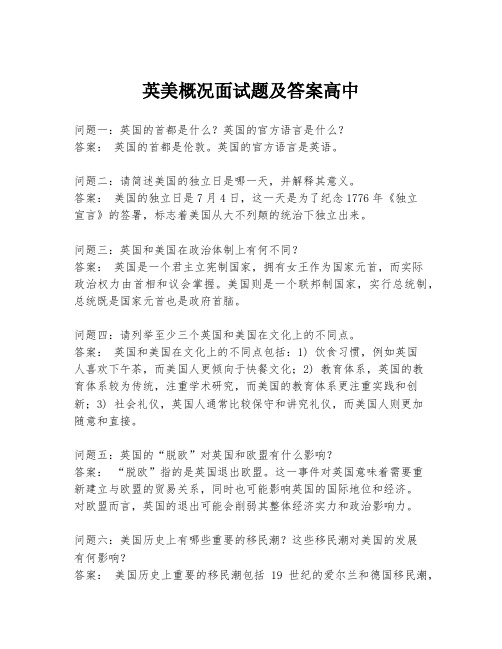
英美概况面试题及答案高中问题一:英国的首都是什么?英国的官方语言是什么?答案:英国的首都是伦敦。
英国的官方语言是英语。
问题二:请简述美国的独立日是哪一天,并解释其意义。
答案:美国的独立日是7月4日,这一天是为了纪念1776年《独立宣言》的签署,标志着美国从大不列颠的统治下独立出来。
问题三:英国和美国在政治体制上有何不同?答案:英国是一个君主立宪制国家,拥有女王作为国家元首,而实际政治权力由首相和议会掌握。
美国则是一个联邦制国家,实行总统制,总统既是国家元首也是政府首脑。
问题四:请列举至少三个英国和美国在文化上的不同点。
答案:英国和美国在文化上的不同点包括:1) 饮食习惯,例如英国人喜欢下午茶,而美国人更倾向于快餐文化;2) 教育体系,英国的教育体系较为传统,注重学术研究,而美国的教育体系更注重实践和创新;3) 社会礼仪,英国人通常比较保守和讲究礼仪,而美国人则更加随意和直接。
问题五:英国的“脱欧”对英国和欧盟有什么影响?答案:“脱欧”指的是英国退出欧盟。
这一事件对英国意味着需要重新建立与欧盟的贸易关系,同时也可能影响英国的国际地位和经济。
对欧盟而言,英国的退出可能会削弱其整体经济实力和政治影响力。
问题六:美国历史上有哪些重要的移民潮?这些移民潮对美国的发展有何影响?答案:美国历史上重要的移民潮包括19世纪的爱尔兰和德国移民潮,以及20世纪的拉丁美洲和亚洲移民潮。
这些移民潮极大地丰富了美国的多元文化,促进了社会和经济的发展,同时也带来了一些社会问题,如文化融合和就业竞争。
问题七:请简述英国的工业革命对世界历史的影响。
答案:英国的工业革命是18世纪末到19世纪初的一场重大社会经济变革,它标志着从手工劳动向机械化生产的转变。
工业革命极大地提高了生产效率,促进了城市化,改变了人们的生活方式,并对全球经济和社会发展产生了深远影响。
问题八:美国的文化多元性是如何形成的?答案:美国的文化多元性主要是由其历史上的大规模移民潮形成的。
英美国家概括名词解释英国部分
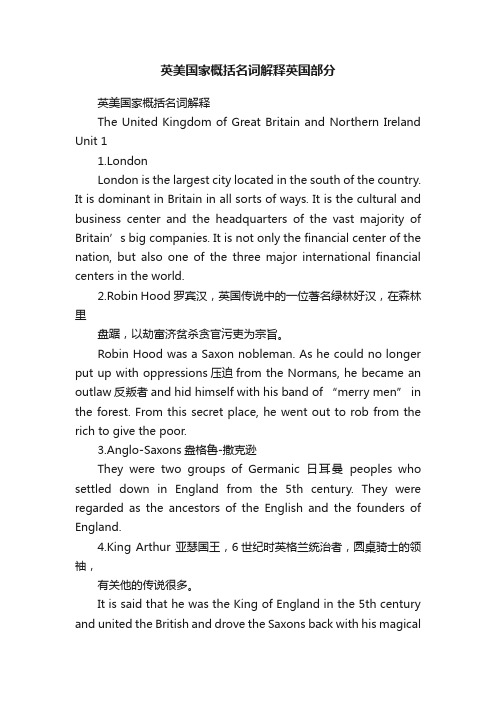
英美国家概括名词解释英国部分英美国家概括名词解释The United Kingdom of Great Britain and Northern Ireland Unit 11.LondonLondon is the largest city located in the south of the country. It is dominant in Britain in all sorts of ways. It is the cultural and business center and the headquarters of the vast majority of Britain’s big companies. It is not only the financial center of the nation, but also one of the three major international financial centers in the world.2.Robin Hood罗宾汉,英国传说中的一位著名绿林好汉,在森林里盘踞,以劫富济贫杀贪官污吏为宗旨。
Robin Hood was a Saxon nobleman. As he could no longer put up with oppressions压迫from the Normans, he became an outlaw反叛者and hid himself with his band of “merry men” in the forest. From this secret place, he went out to rob from the rich to give the poor.3.Anglo-Saxons盎格鲁-撒克逊They were two groups of Germanic日耳曼peoples who settled down in England from the 5th century. They were regarded as the ancestors of the English and the founders of England.4.King Arthur 亚瑟国王,6世纪时英格兰统治者,圆桌骑士的领袖,有关他的传说很多。
英美概况考试题汇总
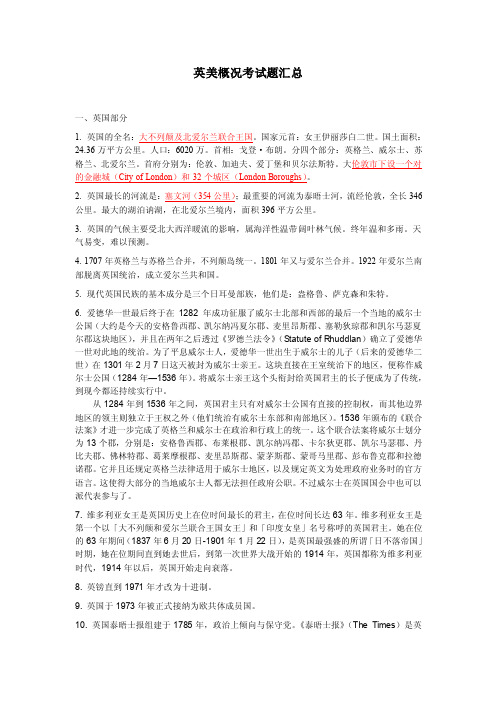
英美概况考试题汇总一、英国部分1. 英国的全名:大不列颠及北爱尔兰联合王国。
国家元首:女王伊丽莎白二世。
国土面积:24.36万平方公里。
人口:6020万。
首相:戈登·布朗。
分四个部分:英格兰、威尔士、苏格兰、北爱尔兰。
首府分别为:伦敦、加迪夫、爱丁堡和贝尔法斯特。
大伦敦市下设一个对的金融城(City of London)和32个城区(London Boroughs)。
2. 英国最长的河流是:塞文河(354公里);最重要的河流为泰晤士河,流经伦敦,全长346公里。
最大的湖泊讷湖,在北爱尔兰境内,面积396平方公里。
3. 英国的气候主要受北大西洋暖流的影响,属海洋性温带阔叶林气候。
终年温和多雨。
天气易变,难以预测。
4. 1707年英格兰与苏格兰合并,不列颠岛统一。
1801年又与爱尔兰合并。
1922年爱尔兰南部脱离英国统治,成立爱尔兰共和国。
5. 现代英国民族的基本成分是三个日耳曼部族,他们是:盎格鲁、萨克森和朱特。
6. 爱德华一世最后终于在1282年成功征服了威尔士北部和西部的最后一个当地的威尔士公国(大约是今天的安格鲁西郡、凯尔纳冯夏尔郡、麦里昂斯郡、塞勒狄琼郡和凯尔马瑟夏尔郡这块地区),并且在两年之后透过《罗德兰法令》(Statute of Rhuddlan)确立了爱德华一世对此地的统治。
为了平息威尔士人,爱德华一世出生于威尔士的儿子(后来的爱德华二世)在1301年2月7日这天被封为威尔士亲王。
这块直接在王室统治下的地区,便称作威尔士公国(1284年—1536年)。
将威尔士亲王这个头衔封给英国君主的长子便成为了传统,到现今都还持续实行中。
从1284年到1536年之间,英国君主只有对威尔士公国有直接的控制权,而其他边界地区的领主则独立于王权之外(他们统治有威尔士东部和南部地区)。
1536年颁布的《联合法案》才进一步完成了英格兰和威尔士在政治和行政上的统一。
这个联合法案将威尔士划分为13个郡,分别是:安格鲁西郡、布莱根郡、凯尔纳冯郡、卡尔狄更郡、凯尔马瑟郡、丹比夫郡、佛林特郡、葛莱摩根郡、麦里昂斯郡、蒙茅斯郡、蒙哥马里郡、彭布鲁克郡和拉德诺郡。
英美概况英国部分练习题
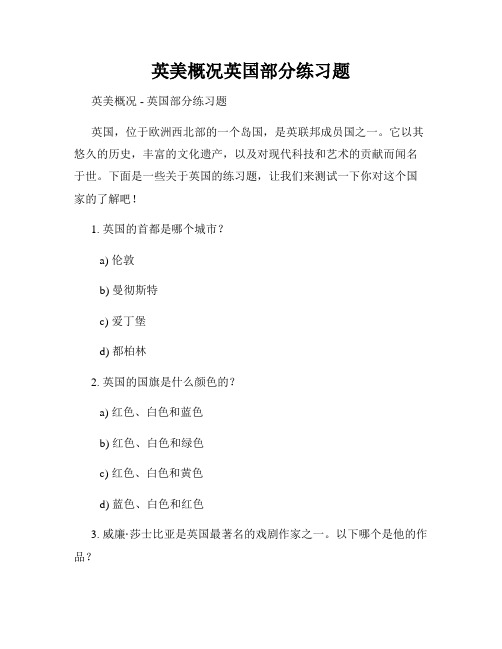
英美概况英国部分练习题英美概况 - 英国部分练习题英国,位于欧洲西北部的一个岛国,是英联邦成员国之一。
它以其悠久的历史,丰富的文化遗产,以及对现代科技和艺术的贡献而闻名于世。
下面是一些关于英国的练习题,让我们来测试一下你对这个国家的了解吧!1. 英国的首都是哪个城市?a) 伦敦b) 曼彻斯特c) 爱丁堡d) 都柏林2. 英国的国旗是什么颜色的?a) 红色、白色和蓝色b) 红色、白色和绿色c) 红色、白色和黄色d) 蓝色、白色和红色3. 威廉·莎士比亚是英国最著名的戏剧作家之一。
以下哪个是他的作品?a) 《哈姆雷特》b) 《鲁密欧与朱丽叶》c) 《奥赛罗》d) 以上都是4. 英国的皇室家族是?a) 伊丽莎白家族b) 斯图亚特家族c) 神秘家族d) 温莎家族5. 英国最著名的晚餐菜肴之一是什么?a) 鱼和薯条b) 汉堡包c) 比萨饼d) 果酱面包6. 英国的标准货币是什么?a) 欧元b) 英镑c) 美元d) 日元7. 英国最古老的大学是?a) 牛津大学b) 剑桥大学c) 帝国理工学院d) 伦敦城市大学8. 英国传统的下午茶时间通常是在下午几点?a) 1点b) 3点c) 5点d) 7点9. 英国最高的峰是什么?a) 英格兰山b) 威尔士山c) 苏格兰山d) 北爱尔兰山10. 英国最有名的音乐节是?a) 格拉斯顿伯里音乐节b) 皇家艾伯特音乐厅音乐节c) 圣理查德音乐节d) 狂欢节希望你已经作出了选择。
接下来,让我们来看看答案。
答案:1. a) 伦敦2. a) 红色、白色和蓝色3. d) 以上都是4. d) 温莎家族5. a) 鱼和薯条6. b) 英镑7. a) 牛津大学8. b) 3点9. c) 苏格兰山10. a) 格拉斯顿伯里音乐节希望这些问题能帮助你更深入地了解英国。
英国是一个充满魅力的国家,拥有丰富的历史和文化遗产,值得我们去探索和学习。
无论你是对历史、文学、音乐还是其他领域感兴趣,英国都能提供给你丰富的资源和体验。
英美国家概况之英国

填空题Chapter 11.The British Isles are situated in the northwest of Europe. They are cut off from the continent by the English Channel. On the north and the east the Isles face the North Sea,and on the west they face the Atlantic Ocean. The full title of the United Kingdom is The United Kingdom of Great Britain and Northern Ireland.3.Before the early 20th century, Northern Ireland was part of Ireland as a whole. In 1920, it become part of the United Kingdom, with a separated parliament and self-government. There were originally six countries in Northern Ireland. But since 1973 it has a single-tier system of 26 administrative districts.4.The climate in Britain is moderated by the Atlantic Gulf Stream, and is much milder than that of many places in the same latitude. The climate is generally equable, but the day to day conditions are changeable.Chapter 21.The Welsh, the Scots, the Irish are the descendants of Celts who came from Europe to the British Isles centuries before the Roman invasion. It was these people whom the Germanic Anglos and Saxons conquered in the5th and 6th centuries AD. These Germanic conquerors were conquered in turn by the Norman French, whenWilliam of Normandy landed near Hastings in 1066. It was from the union of Norman conquerors and the Anglo-Saxons that the English people and the English language were born.2.Cockney English is very rich in slang,especially rhyming slang. The second part of the rhyming slang is often omitted.4.Wales is an ancient Celtic language. In 1535 Welsh was forbidden as an official language, but in 1965 it was given equality with English for all official use in Wales. Welsh literature dates back to the 6th century AD. Much early Welsh poetry is heroic or elegiac, and concerns pre -Christian heroes, and their exploits. Welsh literature had a profound influence in medieval Europe, as it is the source both of Arthurian legend and that of the Holy Grail. From 15th century on ward classical Welsh literature declined.Chapter 31.Soon after 700 BC the Celts from upper Rhine Land of northwest Europe came to settle on the British Isles. The first wave of Celtic invaders was the Gales, whose language is still spoken in Scotland. From about 500 BC another group of Celts called Brythons came and drove the Gales to the north and west. From the Brythons came the English name for Britain. A third wave, Belgae from Northern Gaul, arrived about 100 BC and occupied the greater part of what are now known as the Home Counties.2.The Roman occupation of Britain lasted nearly 400 years, and it was the Roman who brought Christianity to England.5.The Norman Conquest was in effect a French conquest and the imposition upon England of a ruling French aristocracy. In the consequence, Norman-French of the conquerors replace English as an authoritative language in England. English became lower-class language. It was not until 14th century that English again became the language of richer and cultural class. So Middle English(1150-1450) was strongly modified by an extensive infusion of French vocabulary. Chapter 44.The Great Chapter was signed by King John in 1215. This feudal contract guaranteed the barons’traditional feudal rights. It was chiefly important as an expressing of the principle of limited government; it forward the idea that the king was bound by the law of the land. The right of revolt against unjust government was spelled out in the document. This was to be a factor in the American Revolution. The Great Chapter is traditionally regarded as the basis of English liberties.6.The Black Death struck Europe in the middle of the 14th century and reached England in the summer of 1348.The sudden and violent effect in England was the fall in the population, and consequently in the labor force. The government tried to check this by the Statue ofLabourers of 1351, which made it a criminal offence for labourers to demand, or for employers to pay, more than the maximum wages fixed by the justices in the district.Chapter 55.Renaissance means rebirth. The word was first used by Italian scholars in the mid-16th century to express the rediscovery of ancient Roman and Greek culture. But modern scholars are more incline to use the term to express the great variety of changes that Europe underwent politically, economically and culturally between 1450 and 1600.Chapter 63.The Long Parliament lasted for 13 years. During the Civil War, the supporters of Parliament were called Roundheads, while the supporters of the King were called Cavaliers.5.The Habeas Corpus Act has been called one of the four pillars of the British Constitution. The other three includes Magna Carta the Petition of Right of 1628, and the Bill of Rights of 1689.6.In June 1688, both Whigs and Tories invited William and Mary to become the joint rulers of England. This is the famous bloodless or so-called Glorious Revolution of 1688. Since then every English Monarch rules the country by permission of Parliament.Chapter 71.The first Prime Minister in English history was Sir Robert Walpole.3.The Industrial Revolution in Britain started in the second half of the 18th century, and first began in the textile industry.issez faire doctrine means that the government should not interfere economic affaires of private enterprise, and that government should be merely an omnipresent policeman protecting property and compelling the performance of contracts. It soon came to include such ideas as the Sanctity of private property and rights of freedom of contract and free competition; thus, it became the opposite of mercantilism.Chapter 81.The Corn Laws were originally planned to protect English home-grown corn from competition from imported foreign corn, their existence made for higher food prices, and assumed the superior importance of agricultural interests over urban industrial interests.2.Under the Prime Minister Disraeli, the second Reform Bill was passed in 1867. It actually granted nearly universal manhood suffrage in cities. But millions of rural workers still remained voteless. Chapter 121.The United Kingdom has a two-party system. The present two major parties are the Conservative and the Labour parties.2.In 1916the Liberal Party split into two halves, and soon lost its place to the Labour Party.名词解释Chapter 2John Bull:the personification of England or the English. It was created by the writer John Arbuthnot in his satire The History of John Bull. Traditionally depicted as a short stock figure. John Bull was renowned for his bluntness, obstinacy and honesty. Presbyterianism(长老会): Protestant Christian form of church government, which follows the theology and church order of John Calvin. It is based on the Calvinist interpretation of the Bible that regards all members of the Church as equal under Christ. Thus, leaders of the Church are elected by the members rather than installed by a hierarchy of bishops.Chapter 3Danelaw: the code of Dane law. The term can also refer to the part of England that was ruled by Dane law. It was the price England had to pay for a century of peace with the Danes.Chapter 4P192 亨利二世The Black DeathChapter 5Transubstantiation(化体论): Roman Catholic doctrine that the sacramental elements of bread and wine, when consecrated in the Mass, are changed into the body and blood of the risen Christ. It is one of the mysteries of the Christian faith, and still a belief of the Catholic Church.Chapter 6Divine right: This is a Doctrine which states that the king derives his authority from God, not people. The supreme authority of the state is personified in the king, but God could eliminated any king he did not like. It arose in France at the time of Renaissance and gave kings a basis for absolute power.Noncon formists: the members of any Protestant church except the Church of England.Chapter 7MP: Member of Parliament“rotten borough”: one of the parliamentary constituencies in Britainbefore 1832. It held the right to elect members of parliament even though the population was reduced or even non-existent.Blood Mary: Queen of England and Ireland, so called because of her execution of numerous Protestants简答题Chapter 11.How do you describe the land features of Great Britain?3.Do you think Britain has a changeable weather? Why?Chapter22. What is “eisteddfod”?3.Why are the Highlanders called “ladies from hell”?Chapter 34. What were the consequences of the Norman Conquest?1.What was the Roman influence over Britain?3.Why do we say King Alfred was even greater in peace than he was in war?Chapter 41.How did King Henry II reform the courts and law in England?2.Why was King John nicknamed “King of Lackland”3.What’s the significance of the Great Chapter?4.How did the English Parliament come into being?Chapter 5(无.4)2.How and why did the Reformation take place in England?4.What were the distinctive features of the English Renaissance?Chapter 65.Why did the Restoration take place?6.What do you know about the Glorious Revolution?Chapter 71.How did the Primary Ministry in Britain come into being?2.Why was Britain the first country to start the Industrial Revolution?3.What were the causes for the failure of the Chartist Movement?Chapter 82.How did the three reform bills enlarge the suffrage?。
英美国家概况(英国部分)Unit 3 Political system[精]
![英美国家概况(英国部分)Unit 3 Political system[精]](https://img.taocdn.com/s3/m/bdc09e85102de2bd9705885a.png)
Make all the UK laws; Scrutinize (审查) government policy & administration; Hear appeals (上诉) in the highest Court of Appeal in Britain;(The House of Lords) Debate the major issues of the day.
Think about these questions before we start:
1. What are the main functions of Parliament?
2. What is the role of the Monarchy in the British government?
3. What is a constitutional monarchy? When did it begin in Britain?
4. How did the Labor Party come into being?
5. Why and how did the English Parliament come into being?
• The PM is an active member of the legislative, yet also the leading member of the executive.
• The Lord Chancellor is a member of the cabinet and therefore of the executive as well as being head of the judiciary.
• The House of Lords also has a right to vote on bills so they’re part of the legislative but the Lords also contains the Law Lords who are an important part of the judiciary.
英美国家概括 判断正误 英国部分

英美国家概括判断正误The United Kingdom of Great Britain and Northern Ireland Unit 11.Britain is no longer an imperial(帝国) country. T2.The Commonwealth(共和国,民主国) of Nations includes all European countries. F3.1 in 10 of the British population are of non-European ethnicity(种族地位,种族特点). F4.The stereotype(陈规,刻板模式) of the English gentleman never applied(使适用) the majority of the British people. T5.Great Britain includes 3 constituent countries;England, Scotland, and Wales. T6.Northern Ireland is part of Great Britain. F7.When people outside the UK talk about England, they mistake it as Britain sometimes. T8.The Scots and Welsh have a strong sense of being British. F9.Scotland was never conquered by the Romans. T10.Most people in Scotland speak the old Celtic language, called “Gaelic”. F11.Scotland was unified with England through peaceful mean. T12.Wales is rich in coal deposits. T13.Cardiff, the capital of Wales, is a large city. F ?? largest14.The title of Prince of Wales is held by a Welsh according to tradition. F威尔士在1284年被英格兰合并,在爱德华一世征服了威尔士(1277年—1284年)的过程中,他按照威尔士人的要求:“一位在威尔士出生、不会讲英语、生下来第一句话说威尔士语的亲王”作为他们的领袖,爱德华一世将其即将分娩的王后接到威尔士,王子出生后即被封为威尔士亲王,以表示对威尔斯的重视并强化威尔士人的认同感,从此以后,英皇室便将皇储封为威尔士王子,皇子妃封为威尔士王妃,成为皇室继承法统规则之一。
英美概况考试题目及答案
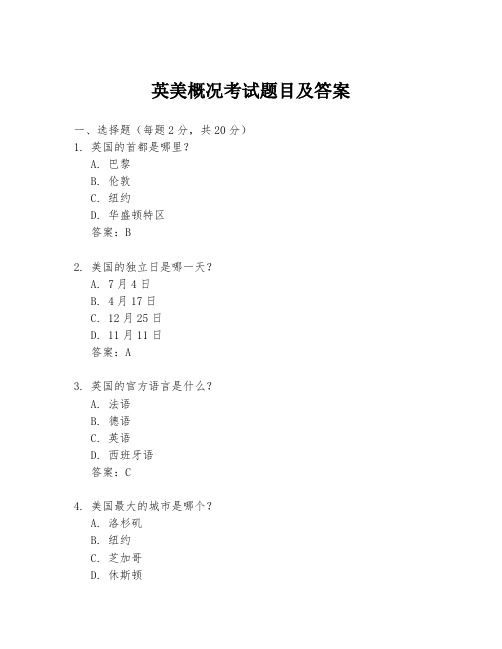
英美概况考试题目及答案一、选择题(每题2分,共20分)1. 英国的首都是哪里?A. 巴黎B. 伦敦C. 纽约D. 华盛顿特区答案:B2. 美国的独立日是哪一天?A. 7月4日B. 4月17日C. 12月25日D. 11月11日答案:A3. 英国的官方语言是什么?A. 法语B. 德语C. 英语D. 西班牙语答案:C4. 美国最大的城市是哪个?A. 洛杉矶B. 纽约C. 芝加哥D. 休斯顿答案:B5. 英国的货币单位是什么?A. 欧元B. 美元C. 英镑D. 日元答案:C6. 美国的国土面积在世界上排名第几?A. 第一B. 第二C. 第三D. 第四答案:B7. 英国的哪个城市是著名的文化和艺术中心?A. 爱丁堡B. 曼彻斯特C. 利物浦D. 格拉斯哥答案:A8. 美国的哪个州被誉为“黄金之州”?A. 德克萨斯州B. 加利福尼亚州C. 佛罗里达州D. 纽约州答案:B9. 英国的哪位君主在位时间最长?A. 伊丽莎白一世B. 维多利亚女王C. 乔治三世D. 伊丽莎白二世答案:D10. 美国的哪个国家公园以其壮观的峡谷景观而闻名?A. 黄石国家公园B. 大峡谷国家公园C. 优胜美地国家公园D. 阿卡迪亚国家公园答案:B二、填空题(每题2分,共20分)11. 英国是由______、苏格兰、威尔士和北爱尔兰组成的联合王国。
答案:英格兰12. 美国的首都华盛顿特区是为了纪念美国的第一位总统______而命名的。
答案:乔治·华盛顿13. 英国的国花是______。
答案:玫瑰14. 美国的宪法规定了______个分支的政府。
答案:三15. 英国的______是英国君主的正式住所,也是英国王室的行政总部。
答案:白金汉宫16. 美国的______是该国最大的河流系统,流经美国的中部大平原。
答案:密西西比河17. 英国的______是该国最大的政党之一,传统上与劳动阶级联系在一起。
答案:工党18. 美国的______是该国最高法院的所在地,也是司法部门的象征。
英美国家概况20道选择题讲解

20道选择题讲解全部题目用英文作答,并将答案写在答题纸的相应位置上,否则不计分。
I. Read the following unfinished statements or questions carefully. For each unfinished statement or question, four suggested answers marked A, B, C and D are given. Choose the one that you think best completes the statement or answer to the question. Write the letter of the answer you have chosen in the corresponding space on the answer sheet. (50 points, 1 point for each)英国部分·1-201. Which of the following is true about the British Commonwealth?A. Members of nations are joined together politically.B. The Commonwealth has special powers.C. The decision to become a member of the Commonwealth is made by Britain.D. It is a free association of independent countries that were once colonies of Britain.答案:【D】【翻译】英联邦是一个自由的组织,成员大多是英国早前的殖民地国家,现都已独立。
2. Under_ ,the feudal system in England was completely established.A. King AlfredB. Henry IIC. Edward ID. William the Conqueror答案:【D】【翻译】在威廉的统治下,英国的封建制度彻底建立起来。
英美国家概括 选择题 英国部分

英美国家概括选择题The United Kingdom of Great Britain and Northern IrelandUnit 11.Which of the following is not considered a characteristicof London? A. The cultural centre. B. The business centre.C. The financial centre. D The sport centre.2.Which of the following is not true about the characteristicsof Britain? A. Economic differences between north and south.B. Difference of social systems between Scotland and Wales.C. Class differences between a white-collar worker and ablue-collar worker. D. Cultural differences between immigrants and British.3.Which of the following cannot be found in London? A.Teahouses. B. Art galleries C. Museums. D. Theatres.4.Which of the following is not true about Britain? A. It usedto be a powerful imperial country in the world. B. It plays an active role as a member of European Union. C. It is a relatively wealthy and developed country. D. It used to be one of the superpowers (超强大国,国际组织) in the world.5.Three of the following are characteristics of London. Whichof the four is exception?A. London is a political, economic and cultural centre of the country.伦敦是四大世界级城市之一,与美国纽约、法国巴黎和日本东京并列。
英美概论 考试复习题

The Society & Culture of Major English-speaking Countries英语国家社会与文化The UK1. What are the four nations which make up of the UK?这四个国家是什么构成的英国吗England, Scotland, Wales, and Northern Ireland2. The UK maintain links with its former colonial countries through a loose andvoluntary organization called ___________.英国保持联系前殖民国家通过宽松、自愿组织称British Commonwealth英联邦3. But more important today to consider modern Britain’s role in its internationalrelations is to emphasize its role as a member of _____但更重要的是今天考虑现代英国年代作用的国际关系是强调其角色的成员European Union欧洲联盟,欧盟4. What are the main religions in the UK? 什么是主要宗教在英国吗Anglicanism (英国国教), Catholicism天主教;天主教义, Christianism耶稣教;基督教, and others (e.g. Islam).5. British history has been a history of invasions. Can you list the invaders fromthe first to the last? 英国的历史上一直是侵略的历史。
你能列举侵略者从第一行到最后一行吗Rome Empire →Germanic peoples: the Anglo-Saxon →Vikings from northern Europe →Normans from northern France罗马帝国日耳曼人:盎格鲁-萨克逊维京人从北欧诺曼人从法国北部6. Who were the forefathers of the English?他们的先辈的英语吗Anglo-Saxon盎格鲁-撒克逊7. Who is King Arthur? Why do the contemporary English people think of KingArthur as their hero?谁是亚瑟王呢?为什么当代英国人觉得亚瑟王的英雄吗A great leader in a English legend derives from the fifth century AD. It is said thathe united the British and drove the Saxons back with his magical sword, Excalibur.一个伟大的领袖,在英国传说中来自第五世纪广告。
- 1、下载文档前请自行甄别文档内容的完整性,平台不提供额外的编辑、内容补充、找答案等附加服务。
- 2、"仅部分预览"的文档,不可在线预览部分如存在完整性等问题,可反馈申请退款(可完整预览的文档不适用该条件!)。
- 3、如文档侵犯您的权益,请联系客服反馈,我们会尽快为您处理(人工客服工作时间:9:00-18:30)。
英美国家概括选择题The United Kingdom of Great Britain and Northern IrelandUnit 11.Which of the following is not considered a characteristicof London A. The cultural centre. B. The business centre.C. The financial centre. D The sport centre.2.Which of the following is not true about the characteristicsof Britain A. Economic differences between north and south.B. Difference of social systems between Scotland and Wales.C. Class differences between a white-collar worker and ablue-collar worker. D. Cultural differences between immigrants and British.3.Which of the following cannot be found in London A. Teahouses.B. Art galleriesC. Museums.D. Theatres.4.Which of the following is not true about Britain A. It usedto be a powerful imperial country in the world. B. It plays an active role as a member of European Union. C. It is a relatively wealthy and developed country. D. It used to be one of the superpowers (超强大国,国际组织) in the world.5.Three of the following are characteristics of London. Whichof the four is exception A. London is a political, economic and cultural centre of the country.伦敦是四大世界级城市之一,与美国纽约、法国巴黎和日本东京并列。
但是伦敦未获英国城市地位,正式来说算不上是城市(其心脏地带伦敦市和威斯敏斯特城才是城市),但因为自18世纪起她一直是世界上最重要的政治、经济、文化、艺术和娱乐中心之一,一般人都误以为其是一整座城市。
B. London has a larger population than all other cities inEngland. C. London is not only the largest city in Britain, but also the largest in the world. D. London has played a significant role in the economic constriction of the country.6. The Tower of London, a historical sight, located in the centre of London, was built by the Conqueror.7. Who were the ancestors of the English and the founders of England A. The Anglo-Saxons8. Which is the largest city in Scotland C. Glasgow格拉斯哥(Glasgow):第一大港与第一大商业中心。
爱丁堡(Edinburgh):首府,是历史上的苏格兰王国首都与文化古都。
9. Why did the Scottish Kings decide to form an independent singular Scottish state in the 9th century A. They needed a unified independent nation to fight against Viking raids (侵袭).10. Where do the majority of people in Scotland live B. In the Lowlands.11. Which of the following statements is not true A. Wales was invaded by Romans. B. Wales was occupied by the Anglo-Saxons.C. Wales was conquered by the Normans.D. Wales was threatened by the English.12. Which of the following parties in Scotland still wants an independent Scotland C. The Scottish Nationalist Party.13. When did Scotland join the Union by agreement of the English and Scottish parliaments (议会) D. In 170714. Llywelyn ap Gruffudd is not a simple historical figure for the Welsh. He is almost considered the legendary hero of Welsh nationalism because D. he unified Wales as an independent nation.Unit 2 A Brief Introduction to the United Kingdom II1.In the 17th century, the English government encouraged peoplefrom Scotland and Northern England to emigrate to the north of Ireland, because A. they wanted to increase its control over Ireland.2.In 1969, the first British soldiers were seen on NorthernIreland street. They came first B. to protect Catholics.3.Northern Ireland is the smallest of the four nations, butis quite well-known in the world for D. its endless politicalproblems.4.Faced with conflicting demands the British government chosea compromise and organized a partition of Ireland in 1921,because B. the British government intended to satisfy both sides—Catholics and Protestants.5.Which of the following statement is not true A. Sinn Feinis a legal political party in Northern Ireland. B. Those who want to unite Northern Ireland with British are called Unionists统一派. C. The Social Democratic and Labor Party 社会民主工党属北爱尔兰 is a very important political party in Britain. D. Those who show their loyalty to the British Crown are called Loyalist.亲英派6.In the early 1970s, the IRA爱尔兰共和军D. carried out aseries of bombing and shooting and attacked the security forces as their main target.7.1972 was the worst year of the political troubles in NorthernIreland, because B. 468 people were killed in Northern Ireland.8.Why did the British government decide to replace thepower-sharing policy with “direct-rule” from London D.above all.(A. The power-sharing policy was not accepted by the majority of Protestants. B. The Northern IrishParliament could not govern the power effectively. C. The Power-Sharing policy couldn’t be carried out.)9.Which of the following statements is not true A. In 1981,some convicted IRA prisoners went on a hunger-strike. B. They demanded for the statue of being “political prisoners”by starving themselves. C. Margaret Thatcher’s government gave in to their political demand. D. The death of prisoners revitalized the political movement of Sinn Fein.10.How many counties郡 are there in Northern Ireland B. 611.Which of the following agreement is accepted by bothCatholics and Protestants in Northern Ireland C. The Good Friday Agreement.北爱和平协议12.According to the Good Friday Agreement, Northern Irelandtoday should be governed by the following jurisdictions 管辖权except A. the jurisdiction of the Republic of IrelandB. the jurisdiction of loyalist ministers.C. thejurisdiction of Great Britain D. the jurisdiction of Northern IrelandUnit 3 The Government of the United Kingdom1.Which of the following is not a characteristic of Britaingovernment A. It offers the Queen high political status andpower. B. It is both a parliamentary democracy and a constitution monarchy. C. It is the oldest representative democracy in the world. D. It has no written form of Constitution.2.Which of the following kings was executed in the civil warC. Charles I3.What happened in 1215 B. Forced by barons, King John signedthe Magna Carta英国大宪章.4.Which of the following is not true about the Great Council大议会 A. They included barons and representatives from counties and towns. B. They were sometimes summoned by the kings to contribute money. C. They later developed into what we now know as the Cabinet.内阁(最后成为议会而不是内阁parliament)D. They represented the aristocrats as well as the communities.5.Under whose reign was the Bill of Rights权力法案 passed B.William of Orange. 威廉三世6.Which of the following is not related to the ConstitutionA. It is a written document which lists out the basicprinciples for government. B. It is the foundation of British governance today. C. Conventions and Laws passed by Parliament are part of the Constitution. D. The common lawsare part of the Constitution.7.Which of the following statements is not correct A. Thereare no legal restraints upon Parliament. B. Strictly speaking, the Queen is part of the Parliament. C. Parliament has the supreme power of passing laws. D. Parliament has no power to change the terms of the Constitution.8.Which of the following is not a true description of theQueen’s role A. The Queen selects the Prime Minister and the Cabinet. B. The Queen symbolizes the tradition and unity of the British state. C. The Queen acts as a confidante to the Prime Minister. D. The Queen is the temporal head of the Church of England.9.Which of the following is not a feature of the House of Lords上议院 A. Lords do not receive salaries and many do not attend Parliament sittings. B. It consists of the Lord Spiritual and the Lords Temporal. C. The lords are expected to represent the interests of the public. D. Most of the lords in the House of Lords are males.10.Which of the following is not based on the fact A. Membersof Parliament elect the Prime Minister and the Cabinet. B.MPs receive salaries and some other allowances. C. MPs are expected to represent the interests of the public. D. Mostof MPs belong to the major political parties.Unit 4 Politics, Class and Race1.Which group of people can’t vote in the general electionA.Members in the House of Commons.B.Lords in the House of Lords.C.The UK citizens about the age of 18.D.The UK resident citizens of the Irish Republic.2.By whom is a “vote of no confidence” decided A. The Houseof Commons.3.Which of the following is not true about the electoralcampaignsA.Big parties can buy time to broadcast their policies onthe television.B.There is a limit on the amount of money candidates canspend in their constituency campaign.C.Candidates and their supporters go door-to-doorpersuading voters to vote for them.D.Candidates criticize each other’s policies to show howgood their own policies are.4.How many seats in the House of Commons should a party holdat least in order to win the election B. 3265.Which of the following description about the Conservativeparty is not trueA.It has been in power for an unusually long period of time.B.It prefers policies that protect individual’s right.C.It receives a lot of the funding from big companies.D.It is known as a party of high taxation levels.6.Which period of time in British history was described as“private affluence and public squalor卑. The 1980s.7. Who is the leader of the Labour party at present B. TonyBlair8.Which of the following is not true about life peers终身贵族A.They are not from the aristocratic families.B.They cannot sit in the House of Lords.C.They earned their titles through their outstandingachievement.D.The titles cannot be inherited by their children.9.Which of the following statements in not true about classsystem in the UKA.People of different classes tend to read different kindsof newspaper.B.Class division is only decided by people’s income.C.Though social advancement is possible, class affects aperson’s life chances.D.The way people speak may identify them as belonging to aparticular class.10.Which of the following is not characteristic of thehereditary aristocracy in the UKA.The noble titles can be inherited by the children.B.They usually own historic house in the country.C.They are the richest people in the UK.D.The senior members can be lords in the House of Lords.11.Which of the following is not an effect of immigrationon British societyA.There is now a varied cuisine for people to choose from.B.Class tension has increase.C.New forms of popular music have emerged.D.Different religious beliefs have been practiced actively12.Which of the following is not a true description of thesituation of ethic minorities in the UKA.They are well represented in the British Parliament.B.They are economically poorer than the white populationC.They are treated unfairly by the justice systemD.They are threatened by some racist groups.Unit five The UK Economy1.Which of the following statements is NOT true about the UKeconomyA.Britain remains one of the Group of Seven large industrialeconomies.B.Britain has experienced a relative economic decline since1945.C.There has been a period of steady decreasing of livingstandards.D.Some smaller economies have overtaken the UK in terms ofoutput per capita.2.Which of the following was NOT the reason for the relativeeconomic decline since 1945A.Britain did not invest in modern and new products.B.Britain spent a high proportion of its national wealth onthe military.C.Britain had been heavily in debt to finance the war.D.Britain had carried out the nationalisation of thebusiness.3.Which of the following livestock has the biggest number inUK D. sheep4.Where is the best agricultural land in Britain A. In thesoutheast of England.5.Which of the following is Not a company in the energy sectorA. ShellB. ICI英国最大的化学公司C. RTZ.D. British Gas 其他为英国三大能源公司6.Which of the following used to be the last independent carcompany in the UK C. Rover.路华,最近被德国收购7.In the aerospace industry, which two countries are ahead ofBritain B. The US and Russia8.Which civil airline was started in 1924 after the First WorldWar A. Imperial Airways.9.What did Frank Whittle do in 1937 B. He developed the firstjet engine.喷气式引擎10.Which company became an important aero-enginemanufacture after WWI B. Rolls Royce.11.Which of the following two companies merged into BritishAerospace A. The British Aircraft Corporation and Hawker-Siddeley Aviation.Unit 6 British Literature1.Which of the following books is written by Geoffrey ChaucerA. The Canterbury Tales.2.Which literary form flourished in Elizabethan age more thanany other form of literature C. Drama3.Among the following writers, who was not one of the greattrioA.Ben JohnsonB.William ShakespeareC.Thomas MaloryD.Christopher Marlowe4.Which of the following did not belong to RomanticismA.Keats.B.Shelley.C.WordsworthD.Defoe.5.Which of the following is a tragedy written by ShakespeareB. Macbeth.6.Which of the following writers was the most famous Scottishnovelist D. Sir Walter Scott.7.Several gifted women played a significant part in the19th-century literature. Which of the following is an exceptionA.Virginia WolffB.Emily BronteC.Jane AustenD.Charlotte Bronte8.Which of the following writers was not associated withModernismA.. LawrenceB.. ForsterC.Charles DickensD.Virginia Woolf9.Which of the following is generally considered to be themasterpiece by Joseph Conrad B. The Heart of Darkness 10.Which of the following writers wrote the book 1984 thatbegan “Postmodernism”in British literature A. George Orwell.Unit 7 British Education System1.In Britain, the great majority of parents sent their childrento C. state schools. 公立学校2.In Britain, children from the age of 5 to 16 B. can legallyreceive completely free education.3.If a student wants to go to university in Britain, he willtake the examination called A. General Certificate of Education—advanced高级水平测试结业证书4.Which of the following is privately funded university inBritainA.The University of CambridgeB.The University of OxfordC.The University of EdinburghD.The University of Buckingham5.Which of the following is not trueA.Parents send their children to public schools because theyare rich.B.Parents send their children to public schools becausetheir children can get better jobs when they leave school.C.Parents send their children to public school because theirchildren can have a better chance of getting into a good university.D.Parents send their children to public school because theirchildren prefer to go to public schools.6.Which of the following is not a characteristic of the OpenUniversityA.It’s open to everybody.B.It requires no formal education qualification.C.No university degree is awarded.D.University courses are followed through TV, radio,correspondence, etc.7.In the examination called “the 11 plus”, students willacademic potential go to A. grammar schools.8.Which of the following is not included in the NationalCurriculumA.Children must study the subjects like English,mathematics, science and so on.B.Children must sit in A-level exams.C.Children must pass national tests.D.Teachers must teach what they are told.9.Which of the following is Not true about the Britisheducation systemA.It’s run by the state.B.It’s funded by the state.C.It’s supervised by the state.D.It’s dominated by the state.10.Which of the following schools would admit childrenwithout reference to their academic abilitiesprehensive schoolsB.Secondary schoolC.Independent schoolsD.Grammar schoolUnit 8 British Foreign Relations1.The author holds that Britain had a big influence on thepostwar international order because B. it had a strong military power prestige.2.Which countries are permanent members of the UN SecurityCouncil C. China, Russia, France, Britain , and the United State 联合国成员3.How much of the globe did Britain rule in its imperial primeC. A third of the globe.4.The present British foreign policy is mainly influenced bysome of the following factors. Which one is an exceptionA.Its imperial historyB.Its geopolitical traits.C.Its special relationship with the United States.D.Its schizophrenic attitude to Europe.5.Which of the following is not involved in making the Britishforeign policyA.The Queen of BritainB.The Foreign and Commonwealth OfficeC.The Prime Minister and the CabinetD.The Ministry of Defense and the Treasury.6.Nowadays the British foreign policy is largely shaped by itsparticipation in C. the United Nations, the EU, NATO, etc.7.Which of the following statements is not trueA.Britain hosts a large American military forceB.63American military bases are under the command of BritainC.There are 63 American military bases in Britain.D.Britain is an outpost of an American-dominated militarybloc.8.Which of the following countries does not have nuclearweapons capabilitiesA.BritainB.The United StatesC.ItalyD.Russia9.There of the following factors have contributed toBritain’s special relationship with the United States toa certain degree. Which is the exceptionA.Britain and the United States share the general ideas inmany respects.B.They have common interest in every respect.C.They agree generally on how the world economy should bemanagedD.They have special links in culture10.Why does Britain have its nuclear naval force B. becauseit’s a traditional sea power.Unit 9 The British Media1.Which of the following is the world’s oldest nationalnewspaper C. The Observe2.Which of the following is the British oldest daily newspaperD. The Times3.Which of the following statements is not true about theBritish mediaA.They supply people with news, keeping them informed ofwhat is happening in the world.B.They are mainly interests in making make huge profits bypublishing advertisements.C.They help shape British culture.D.They provide entertainment.4.A free press is considered very important to the functioningof parliament democracy because A. it plays a watchdog function, keeping an eye on the government.5.In Britain most advertising is carried A. In newspaper.6.Which of the following about the BBC is NOT trueA.There is no advertising on an of the BBC programmesB.The BBC is funded by license fees paid by people whopossess television sets.C.The BBC has four channels. 全国广播电台四个,还有海外广播电台D.The BBC provides the World Service throughout the world.7.How many newspapers are there in Britain B. About 14008.Which of the following newspaper is printed internationallyC. The Financial World.9.Which of the following newspaper is a tabloid A. The Newsof the World.10.Which of the following about the tabloids is not trueA.They are big format newspaper.B.They are often called “the gutter press”C.They mainly deal in scandals and gossip about famouspeople.D.They carry stories with color photos and catchy headlines.Unit 10 Sports, Holidays and Festivals in Britain1.Which of the following was Not an activity in Shakespeare’stimeA.Playing footballB.Having a drink at the pubC.Working the landD.Attending the Grand National.2.Which of the following sports was not invented in BritainA.FootballB.TennisC.BasketballD.Cricket3.Which of the following is not true about football in Britainlions of people attend the FA games each season.B.“Football hooligans”sometimes have violent clashes.C.It was invented by the Scottish people 苏格兰人发明网球D.It was once described as “beastly” violent4.Where is the international tennis championships held B.Wimbledon5.Which of the following is truly a sport of the royal familyD. Horse racing6.Which one of the following is not particularly BritishChristmas traditionA.Enjoying the Pantomime. 童话剧B.The Queen broadcasting her Christmas messageC.Eating chocolate eggsD.Shopping on the Boxing Day7.Easter commemorates D. the Crucifixion and Resurrection ofJesus Christ8.Which community observes the traditional Ramadan D. Muslim伊斯兰教的斋戒9.Which celebration particularly happens on the Queen’sbirthday C. Trooping the Color 大检阅庆祝活动10.Which of the following commemorates the Battle of BoyneD. The Orange March in Northern Ireland.游行庆祝威廉三世击败詹姆士二世11.Of which people is Robert Burns a national poet C, TheScottish people12. On which day is Halloween celebrated A. October 31th.。
